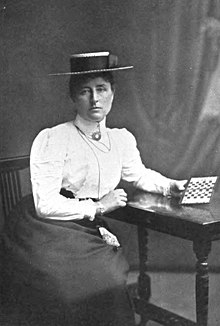Edith Baird: Difference between revisions
→Early years and family: Examination of primary sources including census records reveals Edith was born in Boulogne and not England. |
|||
| Line 5: | Line 5: | ||
==Early years and family== |
==Early years and family== |
||
Edith Elina Helen Winter-Wood was born |
Edith Elina Helen Winter-Wood was born in Boulogne in France, the daughter of Thomas Winter-Wood, a writer, and Eliza Ann (Sole) Winter-Wood.<ref name=devon/><ref name=devon2/> She learned to play chess early in life as her father, her mother, and her older brothers Edward and Carslake were all either amateur or tournament-level chess players.<ref name=devon/> |
||
In 1880 she married |
In 1880 she married William James Baird, Deputy Inspector-General of Hospitals and Fleets for the [[Royal Navy]].<ref name=devon/> They settled in [[Brighton]], where their only child, Lilian Edith, was born. Lilian also went on to become a chess composer.<ref name=devon/> |
||
==Chess composition== |
==Chess composition== |
||
Revision as of 14:44, 28 January 2021

Edith Elina Helen (Winter-Wood) Baird (22 February 1859 – 1 February 1924) was a chess composer who in her day was the most prolific composer of chess problems in the world.[1] She published under her married name as Mrs. W. J. Baird and was sometimes referred to in the press as the "Queen of Chess".[2]
Early years and family
Edith Elina Helen Winter-Wood was born in Boulogne in France, the daughter of Thomas Winter-Wood, a writer, and Eliza Ann (Sole) Winter-Wood.[3][4] She learned to play chess early in life as her father, her mother, and her older brothers Edward and Carslake were all either amateur or tournament-level chess players.[3]
In 1880 she married William James Baird, Deputy Inspector-General of Hospitals and Fleets for the Royal Navy.[3] They settled in Brighton, where their only child, Lilian Edith, was born. Lilian also went on to become a chess composer.[3]
Chess composition
In the mid 1880s, Baird started composing chess problems and within a few years had gained a reputation in the field.[3] In 1888, she took third prize in a Sheffield chess-composition tournament, the first of over two dozen subsequent prizes.[2] Her most celebrated success came in 1893 when she won an international chess-composition tournament against a number of the most notable chess composers of the day.[3] She became the most prolific composer of chess problems in the world, with over 2000 problems to her credit.[1] These were published in newspapers such as the Times of London.[2] Some of these are still considered sound, many are considered elegant, and some are novelties such as letter problems, in which chess pieces have to form the shapes of letters.[2][3]
Baird published two books of her problems: Seven Hundred Chess Problems (1902) and The Twentieth Century Retractor (1907).[5][6][3] The first book took her 14 years to complete.[1]
As a chess player herself, Baird won the Sussex Ladies Championship in 1897 and a silver medal in the tournament three times.[2][3]
References
- ^ a b c Kavalek, Lubomir. "Chess". Washington Post, 20 July 2009.
- ^ a b c d e Gittins, F.R., ed. The Chess Bouquet, or, The Book of the British Composers of Chess Problems. Fielden McAllan & Co., 1897, pp. 9–11.
- ^ a b c d e f g h i "Edith Elina Helen Baird - née Winter-Wood (1859 - 1924)". Chess Devon, 25 August 2008.
- ^ "No. 1 - Thomas Winter-Wood (1818-1905)". Chess Devon, 25 August 2008.
- ^ Seven hundred chess problems, selected from the composition of Mrs. W. J. Baird. London: Henry Sotheran and Co. 1902. Retrieved 29 April 2019 – via HathiTrust.
- ^ The Twentieth Century Retractor, Chess Fantasies, and Letter Problems: Being a Selection of Three Hundred Problems by Mrs. W. J. Baird... Enriched with Shakespearean Quotations. London: Henry Sotheran and Co. 1907. Retrieved 29 April 2019 – via Internet Archive.
